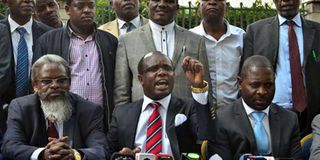Court suspends foreign travel restriction on lecturers

Universities Academic Staff Union (UASU) Secretary-General Constantine Wasonga (center) and other officials during a media briefing on July 18, 2017. The High Court has temporarily suspended travel restrictions imposed on lecturers by the government. PHOTO | FRANCIS NDERITU | NATION MEDIA GROUP
What you need to know:
- Lecturers are regularly required to participate in international and regional collaborative research workshops.
- Uasu members travel on their own individual capacities.
The High Court has temporarily stopped the government’s travel restriction imposed on university lecturers.
In protests dragged to court, the Universities Academic Staff Union (Uasu) succeeded to suspend the restriction on travelling outside the country pending the hearing and determination of a case filed in court on Friday.
Justice Enoch Chacha Mwita issued the order suspending implementation of a circular issued by the Head of Public Service Joseph Kinyua that barred them from travelling outside the country.
RIGHTS
“A conservatory order is hereby granted suspending the enforcement of a circular /letter from Mr Kinyua addressed to all Cabinet secretaries and all principal secretaries, with the directive to circulate to all parastatals under their respective ministries, in so far as affects members of Uasu,” the judge said.
Through lawyer Gitobu Imanyara, Uasu sued the Attorney General and Mr Kinyua while claiming that professors, lecturers and researchers have been arbitrarily barred from enjoying their rights.
“The travels are apolitical and not linked to any political leaning either in the country or outside the country. Uasu members travel on their own individual capacities,” said Mr Imanyara.
Mr Kinyua’s directive on September 13 indicated that no government official can travel outside the country without clearance from President Uhuru Kenyatta.
VICE CHANCELLORS
The civil servants affected include Cabinet secretaries, principal secretaries, ministry officers and chief executives of parastatals as well as their board directors.
On September 20 another circular barred all vice chancellors of public universities and principals of constituent colleges from travelling outside the country.
According to the union, lecturers are regularly required to participate in international and regional collaborative research workshops, specialised conferences and seminars.
It also argued that its members travel regularly to seek from their collaborative institutions out of the country grants and other support in aid of their professional as well as research functions.
In the case documents, they argued that such external collaboration that involves frequent travel has benefitted and continues to benefit higher education sector as well as the country in innovation, intellectual learning and capacity building.





